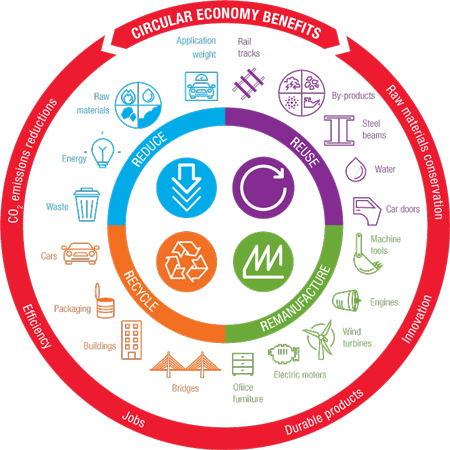MOIT Directive Drives Circular Economy Implementation in the Industry and Trade Sector
- Date: 02/12/2024
- Issuance levels: Central
- Issuing Organization: MOIT
- Type of document: Directive
- Sector: MOIT

Nguyễn Hồng Diên, Minister of Industry and Trade, recently signed and issued Directive No. 14/CT-BCT on December 2nd, 2024. The directive focuses on accelerating the adoption of a circular economy within the Industry and Trade sector.
According to the Directive, a circular economy is defined as an economic model where activities spanning design, production, consumption, and services are intentionally structured to optimize the use of raw materials, extend product lifespans, minimize waste generation, and significantly reduce negative environmental impacts. The circular economy is recognized as a leading global trend and a priority model for numerous nations.
In Vietnam, the circular economy is considered a crucial solution for transforming the growth model, improving quality, efficiency, and competitiveness, boosting labor productivity, and generating new, high-value chains. It aims to effectively balance economic growth with environmental protection. Consequently, the circular economy has garnered significant attention and guidance from the Party, the State, and the Government, as reflected in key policy documents, including:
The Resolution of the 13th National Party Congress, which outlines national development directions for 2021-2030, includes “Building a green, circular, and environmentally friendly economy.”
Politburo Resolution No. 55/NQ-TW, dated February 11th, 2020, concerning strategic directions for Vietnam’s national energy sector development through 2030, with a vision to 2045, specifies: “Implementing environmental protection policies within the energy sector, aligning with greenhouse gas emission reduction targets, and promoting a circular economy and sustainable development.”
Prime Minister’s Decision No. 687/QĐ-CP, dated June 7th, 2022, approving the Project for Circular Economy Development in Vietnam, firmly establishes the principle: “Proactive development of a circular economy is essential and aligns with current trends, fulfilling the need for breakthroughs in economic recovery and the achievement of Sustainable Development Goals (SDGs). It contributes to restructuring the economy, shifting the growth model towards modernization, enhancing competitiveness and adaptive capacity to external shocks, and realizing the National Green Growth Strategy for 2021-2030, with a vision to 2050, while ensuring national defense and security.” This decision tasks the Ministry of Industry and Trade with “Developing circular economy models to foster sustainable production and consumption, and promote efficient and economical energy use.”
To implement the responsibilities entrusted by the Party, State, and Government, and to further advance the circular economy within the Industry and Trade sector, the Minister of Industry and Trade directs all relevant units within and under the Ministry, as well as throughout the Industry and Trade sector. These entities are instructed, based on their respective functions and duties, to research, advise on, propose, and implement solutions that promote the circular economy. This should be achieved through research, review, and integration of circular economy principles into the development policies across all areas of the Industry and Trade sector. Furthermore, they are to develop, finalize, and issue policies and action plans that accelerate circular economy adoption within the Industry and Trade sector, in accordance with current legal frameworks. The directive also emphasizes the promotion of circular economy models within the sector, prioritizing those with high potential across various fields and industries, and especially those that address current trends and practical needs, thereby contributing to the sustainable development goals of both businesses and the broader Industry and Trade sector.














